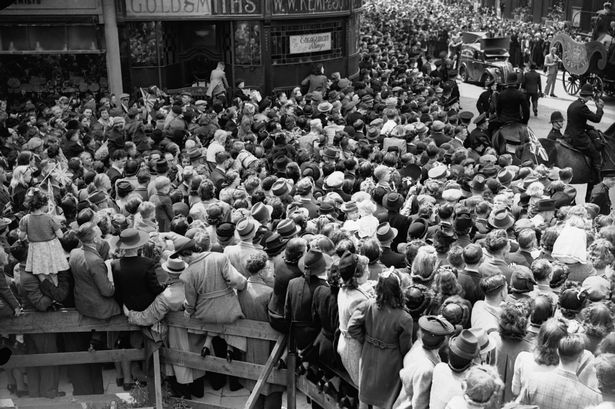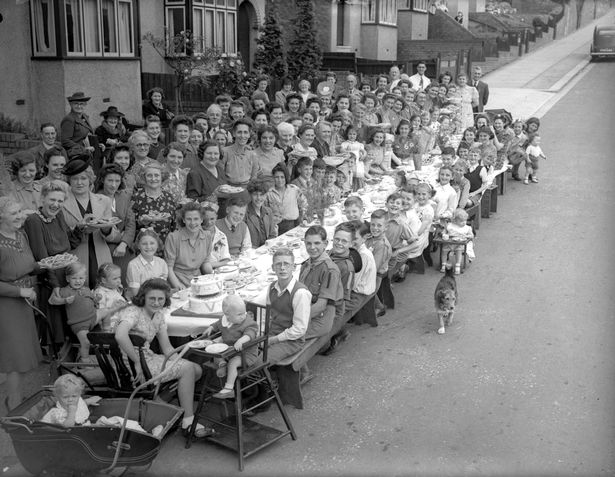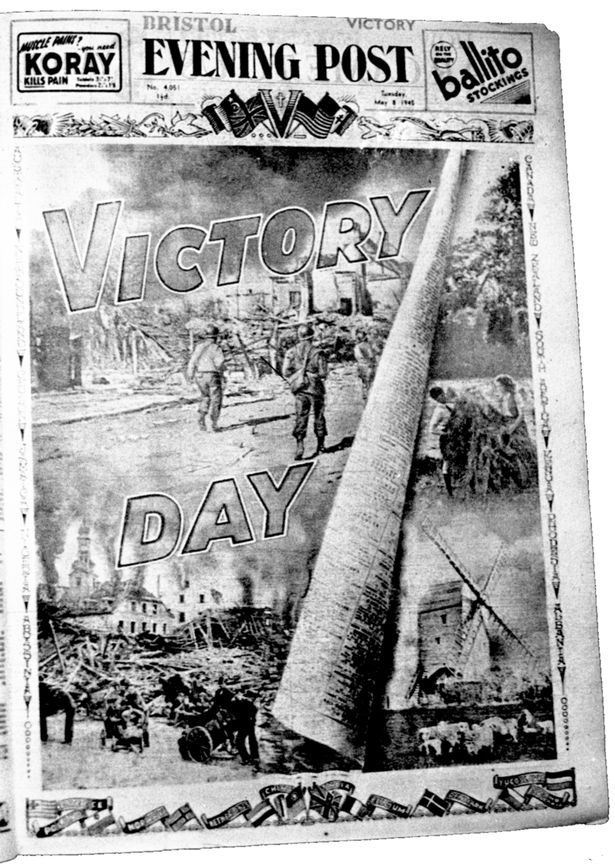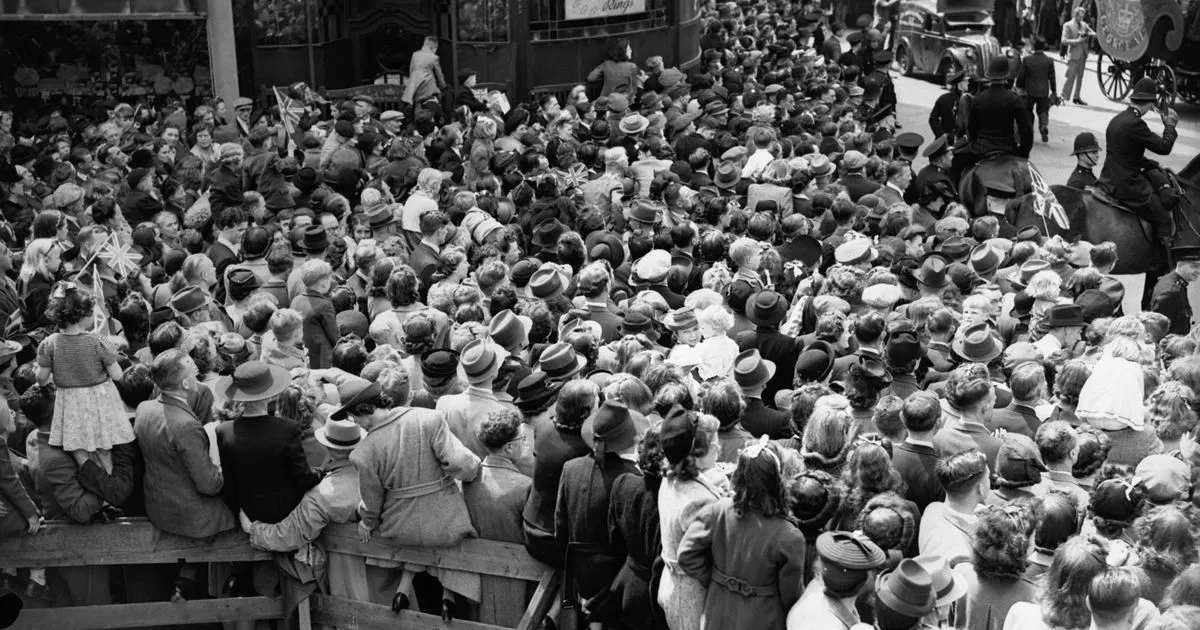Archived reports reveal the emotion of the momentous VE Day as it happenedNews
Eugene Byrne and bristolpost Administrator
05:00, 08 May 2025
 Crowds outside the Council House on Corn Street listening to the Lord Mayor speaking from the traditional “proclamation coach” on VE Day in Bristol(Image: Mirrorpix/ Bristol Post archive)
Crowds outside the Council House on Corn Street listening to the Lord Mayor speaking from the traditional “proclamation coach” on VE Day in Bristol(Image: Mirrorpix/ Bristol Post archive)
Everyone had had plenty of advance notice that the war with Germany was coming to an end. The news on the BBC radio and in the press for months now had been of how the Allied forces were pressing in on Hitler’s Reich from the west, and of the Soviet advance towards Berlin.
Weeks before Hitler finally shot himself in his bunker, there was excited talk in Britain of what was already being called VE – Victory in Europe – Day.
On May 1 Bristol’s council announced the arrangements for the day, including church services, the ringing of church bells, adding that “every endeavour will be made to provide bands and entertainments in the public parks of Bristol on VE Day and the following day.”
The licensing magistrates held a special meeting on May 2 and grandly decreed that on VE Day, all pubs and licensed clubs in the city would be permitted to remain open an hour longer than usual – until 11pm!
(The pubs closing at 10pm wasn’t just about wartime shortages and austerity; it was also because Bristol was a notoriously puritanical place by the mid-20th century thanks to nonconformist religion and the temperance campaigns of previous times. Cinemas, theatres and off-licences were instructed to keep to their existing closing hours.)
Not that the pubs would necessarily be able to meet demand anyway. An official from George’s Brewery told the Western Daily Press: “Only normal supplies will be available, and when these are exhausted public houses will perforce have to close until the next normal deliveries are available.”
“There will be no extra beer,” said a manager from the Bristol United Brewery, “for the simple fact that it is not here.”
People had time to plan their celebrations and pool their precious supplies of eggs, flour, sugar and other edible treats for the street parties that would take place.
Similarly, offices, factories and households alike found long-neglected stores of flags and bunting. Others ran off celebratory fabrics from whatever materials were to hand. But just in case, a few shops advertised in the local press that they had stocks of flags and bunting available.
Over the weekend of Saturday 5th and Sunday 6th of May everyone knew it was just a matter of time.
The news came through on Monday 7th that Germany had unconditionally surrendered and Prime Minister Churchill declared that the following day would officially be VE Day.
 The ladies proudly flourish the cakes they’ve made for a Bristol street party. The big cake on the table in the foreground might be real, or it might be cardboard. VE Day in Bristol(Image: Mirrorpix/ Bristol Post archive)
The ladies proudly flourish the cakes they’ve made for a Bristol street party. The big cake on the table in the foreground might be real, or it might be cardboard. VE Day in Bristol(Image: Mirrorpix/ Bristol Post archive)
Many Bristolians didn’t wait. There were no crowds taking to the street, but around the city flags started to appear from what seemed like every building – the Union flag, the Stars and Stripes and the Soviet red flag predominated, though there were a few French flags, too.
A few people grumbled that they weren’t being allowed to knock off work early, but that evening there were celebratory bonfires in many open spaces across the city. Somehow, the Hawthorns Hotel in Clifton had even obtained some floodlights.
But the main event was to be the following day.
The scene when dawn broke
“When dawn broke … all the streets were already gaily decorated with flags and bunting,” wrote one reporter.
“Houses in the suburbs nearly all carried decoration of some kind, and the children, who with two days’ holiday’ were in high spirits, helped to complete the erection of flags in places where their elders were unable to climb.”
Bristol’s Council House, still in Corn Street – work on the new building on College Green had been suspended due to the war – was decorated with bunting and the flags of all the Allies.
Any people on that day made their way into town just to see the decorations, and practically everyone was wearing some red, white and blue.
“Women had hats of those colours —or even dresses—and wore rosettes. Children had carnival hats red. white and blue, and carried Union Jacks over their shoulders. Many had their bicycles decorated with British colours, and motorists had miniature Union Jacks on their cars, which all helped to make a colourful scene as they proceeded through the beflagged streets.”
That morning, huge crowds gathered in complete silence outside the Council House to hear the Prime Minister’s broadcast relayed on loudspeakers.
There was a brief silence after Churchill finished speaking, and then they sung the national anthem. Shortly afterwards, the city’s traditional ‘Proclamation Coach’, used for imparting important news to Bristolians, pulled up at the top of the High Street to deafening cheers from the crowds.
This curious-looking horse-drawn vehicle, complete with driver in ornate livery, was entered by the Lord Mayor, William Cottrell, along with the Sheriff, Under Sheriff and the City Sword-Bearer.
“The great day has arrived,” said the Lord Mayor.
 (Image: Bristol Post)
(Image: Bristol Post)
“We are gathered here in good heart after nearly six years of struggle. We are gathered in thankfulness with the rest of the world on this wonderful day of victory in Europe.
“Today is an occasion for rejoicing. In spite of our many magnificent victories it did not feel that we could really rejoice until complete victory over the Germans was achieved. Now, thanks to our gallant fighting services, victory has come, so we have every cause to rejoice. Indeed, it is right that we should do so.”
The Lord Mayor waved at the crowds lining the streets as the coach took him to Old Market, the Haymarket, the war memorial, College Green and Queen Square, where he repeated his victory announcement.
As the coach did its rounds, the noise from the cheering crowds was joined by church bells.
By the afternoon, most people were home again for street parties. Many churches were open all day for services or quiet prayer. All were well attended.
Dancing in the streets
The city was thronged again that evening. Many held hands and danced in circles and the turning on of street lights was greeted with immense cheers. The Council’s Electricity Department also laid on floodlighting.
People celebrated elsewhere. “Gaiety was rampant in the Bedminster area during the afternoon,” wrote one paper. “Many streets near Victoria Park there were merry scenes, with dancing in the streets. Effigies of the bad men of Fascism hung from lines across St. Luke’s Road. In St. Silas Street, St. Philip’s, there was one of the best flag and bunting displays in the district.
“At Hanham the High Street was thronged with people. In an avenue nearby people were building a huge bonfire for the evening’s celebrations. Old furniture, timber and rags were all being piled up for a big blaze.
“Flags of all nations fluttered from every available point and Hitler’s effigy was burned at the top of myriads of bonfires which sprang up in the city when darkness fell.
All day youngsters had been busy collecting old furniture in preparation, while many had evidently been preparing homemade fireworks and crackers.
In the centre and in the suburbs the jollity went on into the night. Many of Bristol’s pubs had been drunk dry well before the special 11pm closing time, but we have to assume that many Bristol families had been saving a bottle or two of something special for this great day.
Click here to join our WhatsApp groupPrivacy Notice
